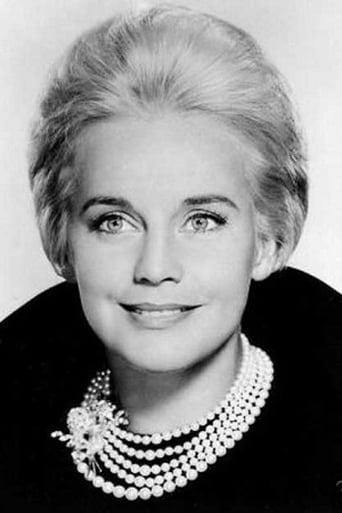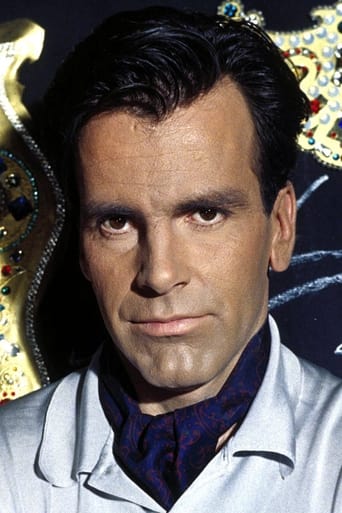Horst in Translation (filmreviews@web.de)
The award-winning "Meine Schwester Maria" or "My Sister Maria" is a 1.5-hour documentary movie from 2002, so this one has its 15th anniversary this year. The director is Oscar winner Maximilian Schell and here he gives us an insight into the life of his older sister Maria, not an Oscar winner, but still a huge star and we find out about her glory days, but also about her life as an old woman suffering from dementia. I would say overall it was competently executed here I guess. You get a good insight most of the time, sometimes even a great one. Still it felt to me to be honest as if the documentary was good, but nowhere near as good as it could have been. This has to do with strange, almost pointless, supporting players here and forgettable plots you could almost say that cost the film quite a bit in the authenticity department. I personally believe that Max Schell would have had a great deal more and more interesting anecdotes to tell about his sister that certainly also would not have been too personal and could have turned the film into something truly special. So it is a success, but not a great success I would say. But maybe you also need to be a bigger Maria Schell fan than I am to really get the love in these 90 minutes. I like her, but I would not say she is anywhere near my personal favorites. That description actually would fit better when it comes to describing how I see Max Schell. Shame there is nobody out the to make a similar documentary about the late actor sadly, he was truly tremendous during his peak. But back to this one here, I think there are some flaws with the execution and concept in terms of the approach and general idea overall, but also many good moments and I believe the positive in here is more frequent than the negative. Go check it out.
robert-temple-1
I have never seen a documentary quite like this one before. It is intensely personal and intimate, full of love, exasperation, devotion, despair, and hope, all mixed up together. In short, it is a portrait of the actress, the late Maria Schell, made in 2002, three years before she died at the age of 79. Naturally, there are many film clips of Maria's amazing acting career, intelligently edited together as part of the narrative of her life, and illustrating from fiction various real aspects of her story. Maria Schell was one of the most glorious presences ever seen on the screen, and had a personality and radiant smile so like an angel that it were as if a piece of Heaven had dropped down by accident, with her sitting on it, and she had to make the best of her exile on earth. In this respect she resembles only a tiny number of actresses in the history of the cinema, such as Hayley Mills and Margaret O'Brien, who had similar angelic qualities as children, and in the case of Hayley Mills, still does as an adult, both off-screen and on. (I met Margaret O'Brien a few times long ago, but as she was then so extremely shy and introverted, I was never able to get her to speak more than a few words, so cannot honestly say what she is really like, other than that she is very nice and extraordinarily quiet.) For reasons never explained in this film, Maria Schell entered a strange mental state because of some very severe brain damage late in life. Whether this was because she had a stroke or as a result of her abortive suicide attempt (caused by a disappointment in love, which is discussed in the film) we are not told. We see a great deal of her sitting up in bed with a beatific expression on her face, as if she were a saint who had forgotten her own name, and somehow mistakenly believed that she might once have been the actress Maria Schell. She speaks coherently and intelligently within certain limits, and has perfect recall of many past events. She watches her own movies over and over again in order to reclaim her memories, and says on film that by doing so she is able to recall everything to do with the shooting of every scene minutely. Her constant watching of herself thus seems less an exercise in vanity than an attempt to remember who she is and was. Her erratic behaviour is shown by the fact that she has ordered eleven Bang & Olufsen television sets to watch herself on, and often has several of them turned on at once. She has no sense of reality or responsibility concerning everyday life anymore, and she phones up stores and orders gigantic crystal chandeliers (two at once!), despite living in a small cottage, and other crazy things, and the people she phones do not realize she is out of touch with reality, so they put the orders through. She eventually goes bankrupt as a result of wild, truly insane, spending, on things she cannot even use, and her brother Maximilian only saves her from having all of her possessions sold at auction by bailiffs at the last minute. To call the situation extremely harrowing is an understatement. Poor Maximilian Schell! He adored his sister and appreciated her perhaps better than anyone, and yet in her damaged mental state she nearly drove him crazy. But how could he be cross with her when she sat up in bed (in between ordering chandeliers) with the face, glowing eyes, and wan smile of an aged angel? Dealing with Maria in that condition was a bit like trying to discipline a beloved dog who has just eaten the supper off the dining table, because how can you explain to the dog the significance of what he has done, the sanctity of the dining table, etc.? One way dogs are disciplined to stop them 'doing their business' on the carpet is you take them by the collar and push their nose down next to the droppings and say 'Bad!' very forcefully several times, and they generally get the message. That is called house-training. But how can you house-train a brain-damaged angel and stop her buying pairs of crystal chandeliers over the telephone as soon as you leave her house? Push her nose into a chandelier? How gruelling it is to watch Maria slowly try to walk a short distance along a path (in the Austrian mountains, where she lived), in good weather and in snow, marking her progress each time with a stick and trying to learn how to walk again. Each yard gained is a triumph. Anyone who has ever been really ill, even temporarily, knows about such things, and how an inch gained at enormous effort is really a mile. At one point, Maria falls face down in the snow and lies there as if she were in Heaven, still beatific in her expression. This film is a film of adoration and testimony by Maria's nearest and dearest, her totally devoted and adoring brother, who has the advantage of having spent a lifetime in films and knew how to make the film. It is an amazing achievement, very painful to watch, but also uplifting in the awareness we derive of the power of the highest form of sibling love to ennoble and transcend, to soar above the limits, and to achieve the angelic level, where Maria Schell's true existence seems always to have been and belonged. Of Maria Schell, one is tempted to say with awe: 'She came and lived amongst us for a time, and then was gone.'
marcomeyer
When Maria Schell retired to her parental homestead in the Austrian alps, her once so glamorous internationally acclaimed movie star life changed from stardom to quiet oblivion. There she occasionally met her family - and the bailiff. Her mental health made it difficult for her to make the difference between fiction and reality. She ordered several expensive TV sets, chandeliers and so forth, not realizing that she was flat broke. Generous to herself and friends alike, she spent millions until the sale by court order of all her belongings including the family homestead was imminent. It was her famous brother Maximilian Schell who at least wanted to save the farm and the surrounding land for the family. The debts were so high and the compulsory auction so near that he had to sell his beloved art paintings in order to gather the astronomical amount of money needed to avoid the loss of his and Maria's childhood home.Maximilian Schell portrays this sad and obviously final episode of his beloved sister Maria's life in a very special docu-drama filled with retrospectives of her movie work. These movie clips are the bright side of her life, contrasting the real life, which was not so real to her anymore. Or was it? Maximilian reflects about the meaning of life and if his sister may have retired in a sort of mental way station claiming the paradise as long as she was living and not only after she would die.This movie actually is an insider movie, a very personal treatment of a family tragedy and full of love, very soft-spoken. The warm and close relationship between brother and sister, both famous actors, is touching without being kitschy. It is knowingly heart-moving, though. The movie's red line is the short distance Maria is forced to walk from the living house to the "hut" where it all began, where her mother gave birth to her and her siblings. Maximilian urges her to walk this way every day and when she would finally reach the hut, everything would be OK. Throughout the movie we observe Maria Schell advancing step by step until she finally stays in front of a stove trying to make fire. She does not notice that she loses control over the fire. All is burning down.Viewers expecting star chitchat will be disappointed as much as those tabloid story hungry masses who played the shocked ones when it turned out that the story of Maria Schell in poverty and mentally demented was true. Maximilian Schell's movie does not show this. It is a documentary, cleverly combined with quite obviously acted scenes. A set up, maybe the last camera, light, action for his sister. The film ends with Oliver's Theme, composed by Oliver Schell. It is a merry melody instantly returning the thoughtful viewers back to the really real life.

